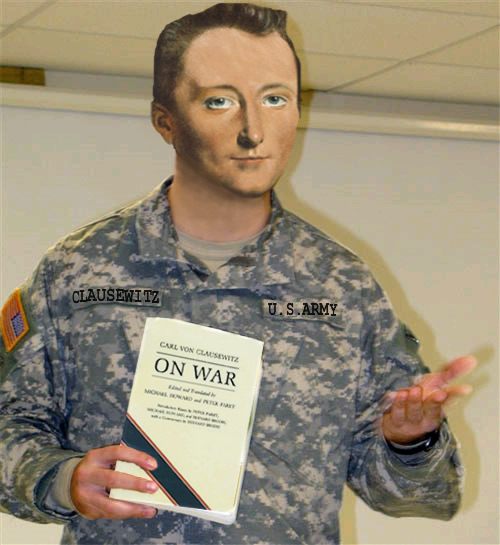
“…we say that there is only one result that counts: final victory“.
– Carl von Clausewitz
On War is a classic of military strategy and perhaps the greatest work ever produced on the nature of war. Clausewitz’s genuine rivals are very few – Sun Tzu and Thucydides come to mind but these comparisons, though equally great in stature, are also at best inexact. How important is Carl von Clausewitz? In the words of the arch-Clausewitzian Professor Chris Bassford:
Clausewitz is the theoretical cornerstone of all the US military’s mid- and senior level PME (Professional Military Education) schools and all US military doctrine. I can say that fairly authoritatively, since I teach at the National War College and have tought at the USMC Command & Staff College and the Army War College, and have also been a US Army soldier (field artillery) and a USMC and Joint Staff doctrine writer
Yet at the same time, Clausewitz is often forgotten, as by the Kaiser’s Grossgeneralstab on the eve of the Great War or by America’s four star grandees at MACV when JFK believed in “flexible response” and LBJ in “escalation”. Then, painfully, after national hubris or martial incompetence brings some great historical debacle, Clausewitz is remembered again, sometimes to be blamed or to be offered up as a savior and the dog-eared copies of On War are taken from the shelf and dusted off.
I think we are living in such a time.
This roundtable has been a delight. Not only did it force me, someone who was not particularly in tune with Clausewitz to give On War a second and more serious reading but the other participants who have posted here or discussed CvC further via email have been enlightening and in some cases, caused me to reconsider prior opinions. For that I thank all of you.
America needs more military strategists and more statesmen who understand how to think strategically. It is a shame that On War and other classics are not required reading in the universities that produce the American elite and it is daunting to consider that we regularly elect politicians to posts of high responsibility who never managed to get through key texts like The Republic or On War. If you couldn’t stare down the ghosts of Plato or Clausewitz from the comfort of your dorm room how will you look a Putin or Ahmadinejad in the eye? How can you steer the ship of state when you do not know the fundamentals of navigation?
Therefore, despite my partiality for Sun Tzu and my unapologetic admiration for John Boyd, I hope more people elect to pick up On War and wrestle with the author until they understand his unsparing but subtle philosophy of war. America can only benefit from a Clausewitzian revival.
“… regularly elect politicians to posts of high responsibility who never managed to get through key texts like The Republic or On War”.
Still hung up on a bunch of DWEMs?
Ha. Me too.
The U of C used to make you read a lot of this sort of stuff: Plato, Thucydides (twice in my case), Weber, Adam Smith, Tocqueville, Machiavelli, Montesquieu, even Clausewitz.
I don’t know what they require there these days, besides Foucault, who is now in the first year core.
I have everyone on your list nailed at least once save for Max Weber ( and in strict honesty, only sections of The Wealth of Nations). Sadly, none of these texts were from college courses where they appear to have vanished as required reading in most universities except in occasional grad seminars. There’s only a few schools that still have a semblance of a western canon any more.
A friend of mine taught U. of C. years ago when a new outsider president launched a PR initiative to water down the famous core curriculum and make the university more “fun”. The students to their credit reacted with contempt as did my friend. maybe you know whom I’m talking about, can’t recall his name; not sure how much of an impact that fellow had on your alma mater but the less he had, the better.
LG, Zen : What exactly are they teachin’ these days in the colleges & universities of America? More economic models that mirror the realm of physics?